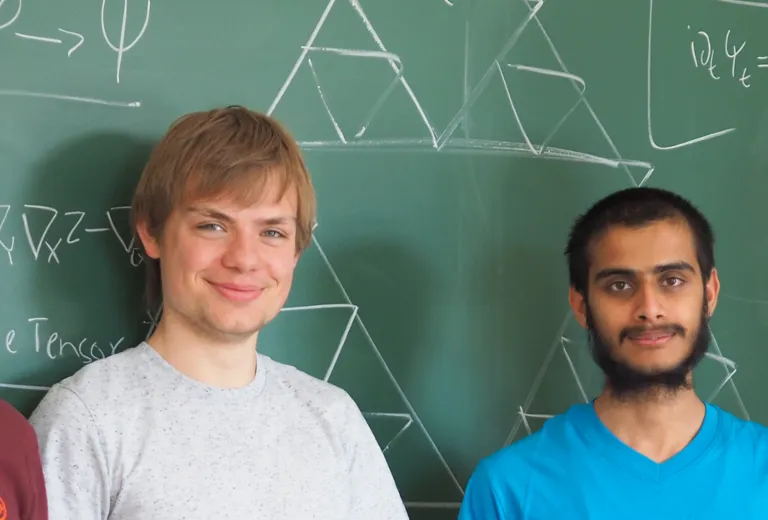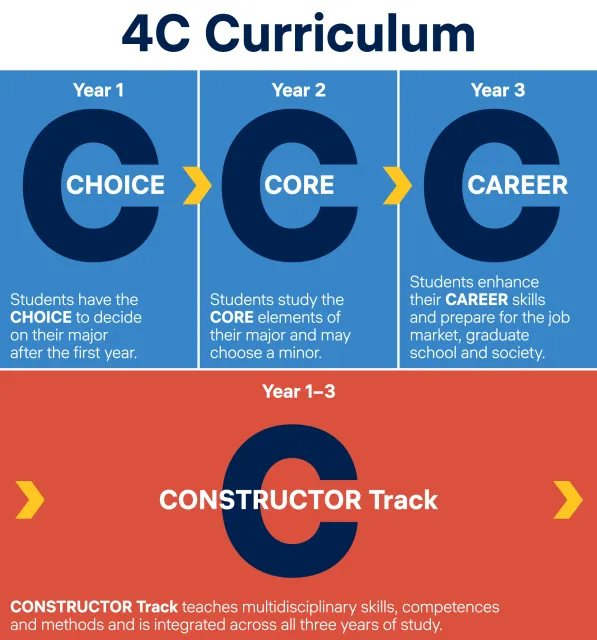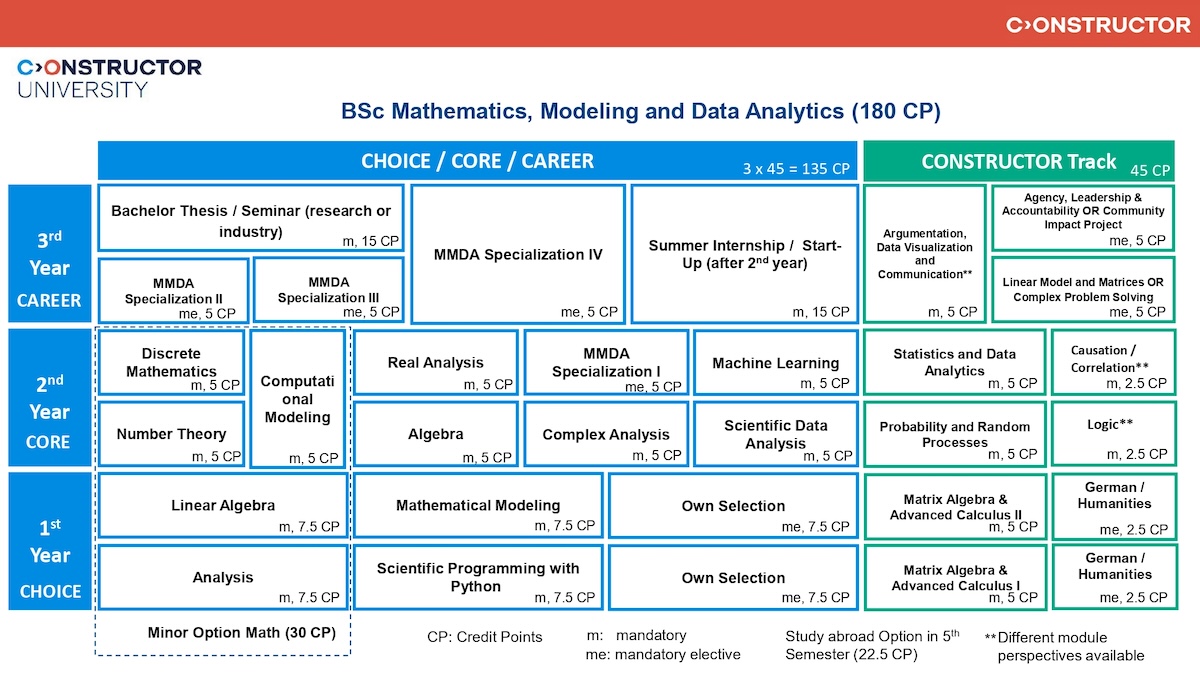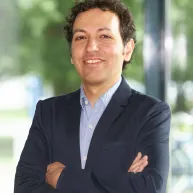

Mathematics, Modeling and Data Analytics
Mathematics, Modeling and Data AnalyticsThis study program belongs to the School of Science.
Location: On Campus
Mathematics, Modeling and Data Analytics (MMDA) is the follow-up program of Mathematics
Mathematics is at the foundation of science, ranging from the beauty of theory and pure thought to applications in almost all areas of the natural sciences, engineering, economics, finance, and even the social sciences. While Mathematics is an ancient subject, and its applications also date back to many centuries, recent advances of the last two decades in Data Science have revolutionized all these applications as well as some areas of mathematics itself.
A key advantage of this interdisciplinary, English-taught program is that it equips students both with mathematical tools for formulating and analyzing problems as well as context provided in modeling real-world problems and algorithmic data-driven approaches towards solving them. The strong mathematical foundation sought for in the program equips students with more powerful methods of analysis and modeling problems serves as a wide source of mathematical questions.
The undergraduate program at Constructor University is a three-year, 180-credit-point program designed to prepare students for a wide range of career paths.
The “4C Model” is the program's backbone, with disciplinary content grouped into three themes according to study years: CHOICE-CORE-CAREER. Additionally, the “CONSTRUCTOR Track”, an integral part of the program, runs parallel throughout the program. It provides students with multidisciplinary content and essential skills such as argumentation, data visualization, societal engagement, and communication.
The curriculum allows students to tailor their education to their goals and to explore different fields of study, with the flexibility to change their major within the first year. Moreover, the programs include a mandatory internship and a study-abroad opportunity in the fifth semester to provide students with hands-on experience and a global perspective.

The first study year is characterized by a university-specific offering of disciplinary education that builds on and expands upon the students’ entrance qualifications. Students select introductory modules for a total of 45 CP from the CHOICE area of a variety of study programs, of which 15-45 CP will belong to their intended major.
To pursue an MMDA major, the following CHOICE modules (30 CP) need to be taken as mandatory modules during the first year of study:
- CHOICE Module: Analysis (7.5 CP, Semester 1)
- CHOICE Module: Scientific Programming with Python (7.5 CP, Semester 1)
- CHOICE Module: Linear Algebra (7.5 CP, Semester 2)
- CHOICE Module: Mathematical Modelling (7.5 CP, Semester 2)
The remaining CHOICE module (15 CP) can be selected according to interest and/or with the aim of allowing a change of major.
Analysis and Linear Algebra cover the foundations of the areas of calculus and linear algebra from a rigorous mathematical perspective. In addition, the modules Mathematical Modelling and Scientific Programming with Python provide the foundation for mathematical modeling and basic programming skills. These CHOICE modules are complemented by the Methods modules (Matrix Algebra and Advanced Calculus I + II) which equip students with complementary skills in calculus and linear algebra.
In their second year, students take a total of 45 CP from a selection of in-depth, discipline-specific CORE modules. Building on the introductory CHOICE modules and applying the methods acquired so far, these modules aim to expand the students’ critical understanding of the key theories, principles, and methods in their major for the current state of knowledge and best practice.
To pursue Mathematics, Modeling and Data Analytics as a major, 40 CP mandatory CORE modules need to be acquired:
- CORE Module: Algebra (m, 5 CP)
- CORE Module: Complex Analysis (m, 5 CP)
- CORE Module: Real Analysis (m, 5 CP)
- CORE Module: Number Theory (m, 5 CP)
- CORE Module: Discrete Mathematics (m, 5 CP)
- CORE Module: Computational Modeling (m, 5 CP)
- CORE Module: Machine Learning (m, 5 CP)
- CORE Module: Scientific Data Analysis (m, 5 CP)
Students complement their studies by taking 5 ECTS of the second/third year Specialization modules:
- MMDA Specialization: Topology and Differential Geometry (me, 5 CP)
- MMDA Specialization: Foundations of Mathematical Physics (me, 5 CP)
- MMDA Specialization: Stochastic Modeling and Financial Mathematics (me, 5 CP)
- MMDA Specialization: Dynamical Systems (me, 5 CP)
- MMDA Specialization: Stochastic Processes (me, 5 CP)
During their third year, students prepare and make decisions for their career after graduation. To explore available choices, and to gain professional experience, students take a mandatory summer internship. The third year of studies allows Mathematics, Modeling and Data Analytics students to take specialization modules within their discipline, but also focuses on the responsibility of students beyond their discipline.
The 5th semester also opens a mobility window for ample study abroad options. Finally, the 6th semester is dedicated to fostering the research experience of students by involving them in a Bachelor thesis project.
To pursue Mathematics as a major, students take all in all 20 CP from mandatory elective Specialization modules:
- MMDA Specialization: Stochastic Processes (me, 5 CP)
- MMDA Specialization: Foundations of Mathematical Physics (me, 5 CP)
- MMDA Specialization: Dynamical Systems (me, 5 CP)
- MMDA Specialization: Topology and Differential Geometry (me, 5 CP)
- MMDA Specialization: Stochastic Modeling and Financial Mathematics (me, 5 CP)
The following modules from Physics and Data Science and master's program in CSSE can substitute up to 5 CP of the above Specialization modules:
- PHDS CORE: Quantum Mechanics (me, 5 CP)
- PHDS CORE: Analytical Mechanics (me, 5 CP)
- PHDS Specialization: Particle Fields and Quanta (me, 5 CP)
- MSc CSSE Specialization: Quantum Informatics (5 CP)
As a core element of Constructor University’s employability approach students are required to engage in a mandatory two-month internship of 15 CP that will usually be completed during the summer between the second and third year of study. This gives students the opportunity to gain first-hand practical experience in a professional environment, apply their knowledge and understanding to a professional context, reflect on the relevance of their major in employment and society, reflect on their own role in employment and society, and find professional orientation. As an alternative to the full-time internship, students interested in setting up their own company can apply for a start-up option to focus on the development of their business plan.
The CONSTRUCTOR Track is another important feature of Constructor University’s educational model. The Constructor Track runs orthogonal to the disciplinary CHOICE, CORE, and CAREER modules across all study years and is an integral part of all undergraduate study programs. It provides an intellectual tool kit for lifelong learning and encourages the use of diverse methodologies to approach cross-disciplinary problems. The CONSTRUCTOR track contains Methods, New Skills and German Language and Humanities modules.
Methods
Methods and skills such as mathematics, statistics, programming, data handling, presentation skills, academic writing, and scientific and experimental skills are offered to all students as part of the Methods area in their curriculum. The modules that are specifically assigned to each study programs equip students with transferable academic skills. They convey and practice specific methods that are indispensable for each students’ chosen study program. Students are required to take 20 CP in the Methods area. The size of all Methods modules is 5 CP.
To pursue MMDA as a major, the following Methods modules (20 CP) need to be taken as mandatory modules:
- Methods Module: Matrix Algebra & Advanced Calculus I (m, 5 CP)
- Methods Module: Matrix Algebra & Advanced Calculus II (m, 5 CP)
- Methods Module: Probability and Random Processes (m, 5 CP)
- Methods Module: Statistics and Data Analytics (m, 5 CP)
New Skills Modules
This part of the curriculum constitutes an intellectual and conceptual tool kit that cultivates the capacity for a particular set of intellectual dispositions including curiosity, imagination, critical thought, and transferability. It nurtures a range of individual and societal capacities, such as self-reflection, argumentation and communication. Finally, it introduces students to the normative aspects of inquiry and research, including the norms governing sourcing, sharing, withholding materials and research results as well as others governing the responsibilities of expertise as well as the professional point of view. Students in this study program are required to take the following modules in their second and third year:
- New Skills Module: Logic (m, 2.5 CP)
- New Skills Module: Causation and Correlation (m, 2.5 CP)
- New Skills Module: Argumentation, Data Visualization and Communication (m, 5 CP)
Furthermore, they must choose either
- New Skills Module: Linear Model/Matrices (me, 5 CP) or
- New Skills Module: Complex Problem Solving (me, 5 CP)
as well one of the following modules:
- New Skills Module: Agency, Leadership and Accountability (me, 5 CP) or
- New Skills Module: Community Impact Project (me, 5 CP).
German Language and Humanities Modules
German language abilities foster students’ intercultural awareness and enhance their employability in their host country. They are also beneficial for securing mandatory internships (between the 2nd and 3rd year) in German companies and academic institutions. Constructor University supports its students in acquiring basic as well as advanced German skills in the first year of the Constructor Track. Non-native speakers of German are encouraged to take 2 German modules (2.5 CP each), but are not obliged to do so. Native speakers and other students not taking advantage of this offering take alternative modules in Humanities in each of the first two semesters.

All study programs at Constructor University are accredited by the German Accreditation Council, guaranteeing adherence to high academic quality and international standards. This accreditation confirms that each program meets formal and subject-related criteria in terms of content, structure, and intended learning outcomes.
Join Constructor University in 5 easy steps:
- Complete your application
- Receive your decision after 3-4 weeks
- Learn about financing options
- Enroll and pay your deposit
- Settle in during O-Week and start your studies


Discover all the information you need about our fees and financing options for Constructor students. Our dedicated Student Financial Service Team will assist you in finding the best financial solution that will enable you to pursue your desired program and create a successful career path.
Cost of attendance 2025 / 2026
The direct costs of attendance include tuition, room and board, and fees, as outlined below.
A degree in Mathematics, Modeling and Data Analytics opens the door for a wide range of career options. These include:
- Insurance companies hire mathematicians in actuarial and other analyst positions.
- Quantitative Finance and Financial Engineering offers numerous opportunities involving fairly deep mathematical concepts.
- Operations Researchers help organizations, businesses, and government find efficient solutions to organizational and strategic planning questions, including scheduling and distribution problems, resource allocation, facilities design, and forecasting.
- Mathematicians are frequently employed in Information Technology positions. In particular, mathematical knowledge is essential for work in information security and cryptography.
- Statisticians are employed by large organizations and work in research and development divisions from academia to industry to analyze data from surveys and experiments.
- Education offers a wide field of employment ranging from secondary school teachers to university professors.
- There are job opportunities in Engineering Mathematics in sectors from aerospace engineering and petroleum engineering to a wide range of other engineering disciplines.
- Last, but not least, mathematicians pursue academic careers at research institutes or universities.

This study program is part of the School of Computer Science & Engineering.
The School of Computer Science and Engineering focuses on research and development in information, communication, and production technologies, intelligent and autonomous systems, as well as the flow of goods.
Key disciplines in the school include Mathematics, Computer Science, Robotics, and Electrical Engineering.


Become part of a global community
Constructor University Students come from all over the world to live and learn at Constructor University. Our student body represents 120 nations. They form an ambitious campus community whose internationality is unprecedented in Europe. Constructor University’s green and tree-shaded 80-acre campus provides much more than buildings for teaching and research.

Call us or write us – we are happy to help you with your inquiry.
Phone: 0421 200 4200
Email: study@constructor.university

